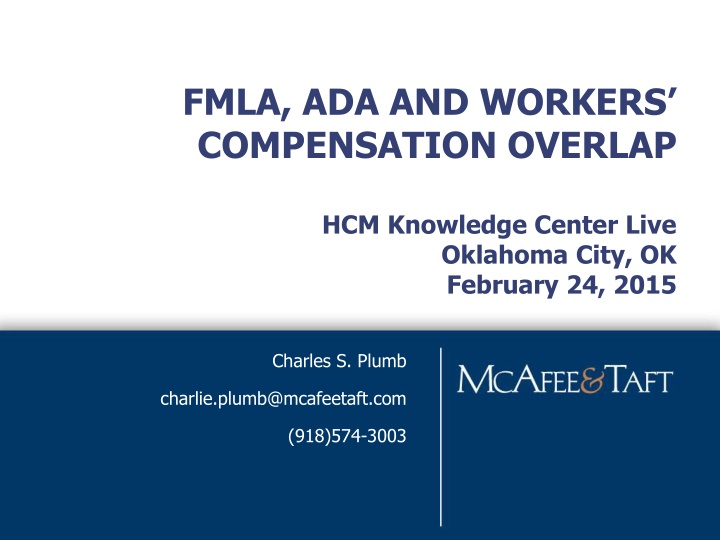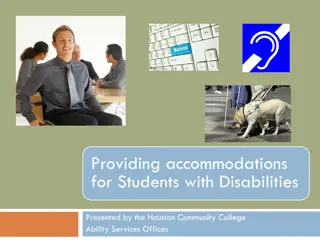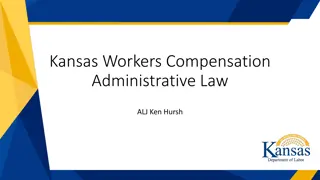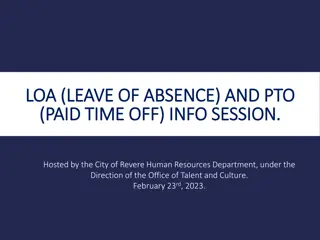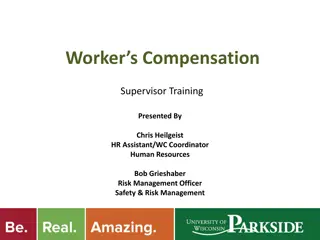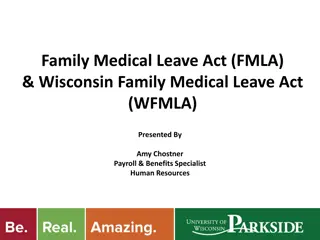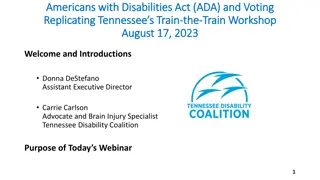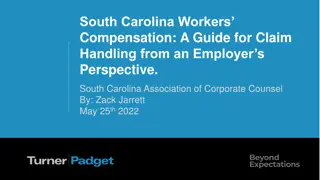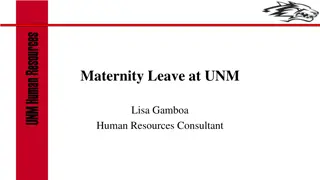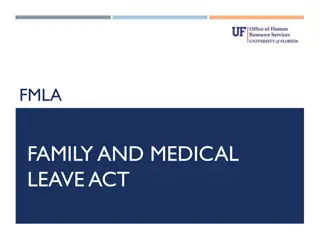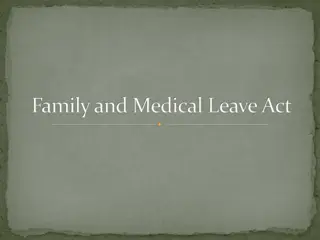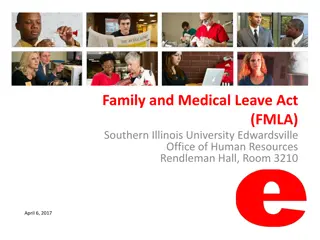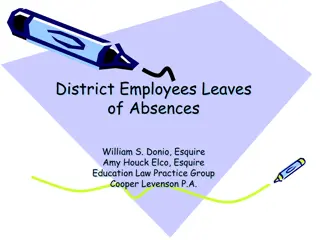FMLA, ADA, and Workers' Compensation Overlap
Explore the intersection of FMLA, ADA, and Workers' Compensation laws, including employer coverage, triggering health conditions, employee eligibility, and rights provided. Gain insights into regulations and enforcement surrounding these key regulations.
Download Presentation

Please find below an Image/Link to download the presentation.
The content on the website is provided AS IS for your information and personal use only. It may not be sold, licensed, or shared on other websites without obtaining consent from the author.If you encounter any issues during the download, it is possible that the publisher has removed the file from their server.
You are allowed to download the files provided on this website for personal or commercial use, subject to the condition that they are used lawfully. All files are the property of their respective owners.
The content on the website is provided AS IS for your information and personal use only. It may not be sold, licensed, or shared on other websites without obtaining consent from the author.
E N D
Presentation Transcript
FMLA, ADA AND WORKERS COMPENSATION OVERLAP HCM Knowledge Center Live Oklahoma City, OK February 24, 2015 Charles S. Plumb charlie.plumb@mcafeetaft.com (918)574-3003
REGULATIONS AND ENFORCEMENT FMLA U.S. Department of Labor, Wage & Hour Division ADA Equal Employment Opportunity Commission Workers Compensation State agency and/or court system.
WHAT EMPLOYERS ARE COVERED? FMLA Private employers 50 or more employees All public employers ADA 15 or more employees Workers Compensation As few as one employee (controlled by state law)
TRIGGERING HEALTH CONDITIONS FMLA a serious health condition Incapacitated and receipt of treatment. Chronic, recurring health conditions. Absences to receive treatment. ADA a disability that substantially limits one or more major life activities. Actual disability Record of disability Regarded as disabled
TRIGGERING HEALTH CONDITIONS Workers Compensation health condition arising out of the course of employment - Physical or mental conditions - ADA s expanded definition of disability means more overlap.
IS THE EMPLOYEE ELIGIBLE FOR FMLA? -Determined as the date when leave begins Employed for 12 months Worked at least 1,250 hours during the last 12 months Employed at a site where at least 50 employees work within a 75 mile radius.
EMPLOYEE RIGHTS PROVIDED BY THESE LAWS FMLA 12 weeks of unpaid leave and reinstatement Continuation of health benefits No discrimination or retaliation ADA No discrimination or retaliation Reasonable accommodation (no undue hardship)
EMPLOYEE RIGHTS PROVIDED BY THESE LAWS Workers Compensation Medical treatment and rehabilitation Disability benefits No discrimination or retaliation
THE OVERLAP Workers Compensation health condition + missed work = FMLA leave ADA disability + missed work = FMLA leave Depends Workers Compensation = ADA Disability? FMLA Leave = ADA disability?
WHEN DO FMLA, ADA AND WORKERS COMPENSATION OVERLAP? Request or need leave for a health condition Difficulty performing their job Alternative work or light duty Need for medical information Release from care or return to work
REQUEST OR NEED FOR LEAVE How does the need for leave arise? Specific request by an employee Employer has reason to know employee may need health-related leave. Once employer has reason to know, it is the employer s obligation to investigate.
REQUEST OR NEED FOR LEAVE Sparks v Sunshine Mills (11thCir. 9/12/14) Employee tells supervisor it looks like it was very possible he was going to have to have surgery. Notice to employer/supervisor must be sufficient to make the employer aware that the employee needs FMLA-qualifying leave, and the anticipated timing and duration of the leave. Here, not sufficient notice of need for FMLA leave.
REQUEST OR NEED FOR LEAVE Poole v. Centennial Imports, Inc. (D. Nev. 5/19/14) Informed his supervisor he was having knee surgery and requested unpaid leave. He was fired and told he could return to work after the surgery and recuperation. Leave of absence for needed treatment (non- FMLA) may be reasonable accommodation. Employer should have discussed and considered possible leave.
REQUEST OR NEED FOR ACCOMMODATION How does the need for accommodation arise? Specific request by employee Employer has reason to know employee may need an accommodation. Cole v. Cobb Cnty School Dist., (N.D. Ga 9/12/14) Teacher on leave for paranoid delusions sent email, I need paperwork and what I need to do to move schools. Insufficient to be treated as an accommodation requests. No discussion what limitations, duration, a need for accommodation.
REQUEST OR NEED FOR ACCOMMODATION Once the employer has reason to know it is the employer s obligation to initiate the interactive process. Considering light or modified duty temporary (healing/recuperating) or permanent. Leave including additional time beyond FMLA 12 weeks.
REQUEST OR NEED FOR ACCOMMODATION EEOC v. Princeton Healthcare Sys., (D.N.J. 6/26/14) Fired under the employer s blanket policy that prohibited any additional leave beyond the 12 weeks afforded by FMLA. Class action filed by EEOC challenging the blanket policy. Settled for $1.35 million.
REQUEST OR NEED FOR ACCOMMODATION FMLA and light/modified duty If eligible for FMLA leave, employee not required to accept light/modified duty. If FMLA eligible employee chooses light/modified duty rather than leave, light/modified duty does not count against their 12 weeks FMLA entitlement. BUT: rejection of light/modified duty offer may disqualify Workers Compensation claimant from receiving temporary total disability benefits.
REQUEST OR NEED FOR ACCOMMODATION Barfield v. Donahue, (N.D. Ill. 9/17/14) Extended absences from work (cumulatively 4 months) and submitted notes from her doctor she is totally disabled. Employer required to initiate discussions with employee.
REQUEST OR NEED FOR ACCOMMODATION Interactive discussion is handled on an individual basis. Mandatory, standard forms are discouraged by the EEOC.
MEDICAL INFORMATION AND ABSENCE FMLA specific guidelines Request in writing FMLA medical certifications within five business days of learning of need or the beginning of leave. Medical certification must be received by employer within fifteen calendar days of requests. Content of medical certification DOL form available. When condition began and possible duration Medical facts to support leave Information on any planned treatment
MEDICAL INFORMATION AND ABSENCE Information of frequency/duration of recurring, intermittent absences. Employee is unable to perform their job. Problems with FMLA medical certification Incomplete Complete but vague, ambiguous or inconsistent Questions of authenticity Employee s responsibility to provide sufficient FMLA certification.
MEDICAL INFORMATION AND ABSENCE Written notice to employee of how FMLA certification is insufficient. Employer should explain how it is insufficient, and provide an employee an opportunity to cure. EEOC Enforcement Guidance, Ques. No. 11. Seven calendar days to obtain sufficient/corrected certification. Second Opinion and Third Opinions Recertification Every six months for continuing conditions
MEDICAL INFORMATION AND ABSENCE If you have a good faith questions about employee s use of FMLA Annual certification ADA and requests for medical information When job-related and consistent with business necessity Limited in scope to information necessary under the circumstances. Determining an individual s functional capacity
MEDICAL INFORMATION AND ABSENCE A deterioration of job performance Considering the necessity and nature of potential accommodations. Gilreath v. Cumberland Cnty. Bd. Of Educ. (E.D.N.C. 7/31/14) School Band Director with ADHD requests accommodations and offered a letter from his physician. The medical information was insufficient to support the Band Director s request for accommodations, the Principal and School Board were obligated to explain the inadequacies and allow the Band Director a chance to supplement.
MEDICAL INFORMATION AND ABSENCE Requests for leave as a form of accommodation. Silva v. City of Hildago, Tex. (5thCir. 7/17/14) SWAT officer exhausted all leave for an off-duty broken leg and requested light duty desk job or indefinite leave until she recuperated. Termination did not violate FMLA or ADA. No light duty jobs available and requested accommodations or indefinite leave was unreasonable. Obligation to participate in the interactive process in good faith Consistent employer requirements for all forms of leave. Employee s obligation to obtain the necessary medical documents and provide to the employer.
MEDICAL INFORMATION AND ABSENCE It is the employee s obligation to obtain necessary medical documents and provide to the employer. - Unlike FMLA, no specific guidelines for ADA requests for health information. - May rely upon medical information obtained during a Workers Compensation claim to make FMLA decisions. - May use FMLA medical certification information in addressing ADA accommodation inquiry.
SUBSTITUTION OF LEAVE ISSUES May require employees to apply accrued paid leave (e.g.: sick leave, vacation, PTO) at the same time (concurrently) while on unpaid FMLA leave. May require FMLA leave to run concurrently with Workers Compensation leave. If employee is on FMLA leave and is receiving Workers Compensation, LTD or STD, they cannot also be required to apply accrued paid leave.
SUBSTITUTION OF LEAVE ISSUES - Employer s FMLA policy must spell-out the requirements of concurrent leave - Must provide notice to employees of concurrent leave.
RETURNING TO WORK AFTER AN ABSENCE FMLA reinstatement to same or equivalent position if Has not exhausted FMLA 12 weeks Capable of performing the job ADA- return to work if capable of performing the essential functions of the job with or without reasonable accommodations.
RETURNING TO WORK AFTER AN ABSENCE Baxter v. Spring Valley Hosp., (D. Nev. 8/13/14) Employer miscalculated the ending date of employee s medical leave and unilaterally changed her return-to-work date. Determining the return-to-work date is part of the interactive accommodation process. Employer should have communicated with employee about the necessity and timing of her return-to-work, rather than unilaterally acting.
RETURNING TO WORK AFTER AN ABSENCE Budhan v. Reading Hosp. and Med. Ctr., (3rdCir. 8/27/14) Prevented from returning to work by employer, although doctor authorized her to resume her job while three fingers in her right hand were still splinted. May amount to the employer overruling the treating physician s assessment.
RETURNING TO WORK AFTER AN ABSENCE Best Practices Policies explaining the necessity of a fitness-for-duty exam when returning to work. FMLA Notice and Designation reminds employees of the requirement. No 100% Release required. Apply fitness-for-duty exam requirements consistently. If unable to return to former position, consider accommodation.
RETURNING TO WORK AFTER AN ABSENCE White v. Cnty. Of Los Angeles, (Cal. Ct. App. 4/15/14) D.A. Investigator who carries a weapon as part of her job returned to work from FMLA leave due to depression. D.A. s request that she undergo a second fitness- for-duty examination four months after FMLA leave was job-related and consistent with business necessity.
THE OVERLAP CHECKLIST A health condition covered by Workers Compensation? Does FMLA apply to me? Is this employee eligible for FMLA leave? Does the employee suffer from a serious health condition under the FMLA? Has the employee exhausted their 12 weeks of FMLA leave? Is this condition a disability under the ADA?
TAKEAWAYS Don t deal with FMLA, ADA and Workers Comp situations in isolation. It s all about having meaningful communication with employees about health issues don t avoid. Assume ultimately it will be the employer s obligation not the employee s to be proactive when investigating and determining health issues.
QUESTIONS Charles S. Plumb McAfee & Taft charlie.plumb@mcafeetaft.com (918)574-3003
